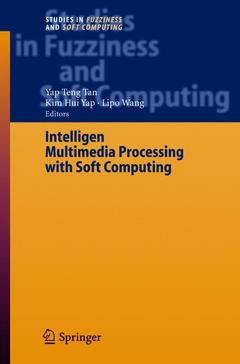Description
Intelligent Multimedia Processing with Soft Computing, 2005
Studies in Fuzziness and Soft Computing Series, Vol. 168
Coordinators: Tan Yap Peng, Yap Kim-Hui, Wang Lipo
Language: English
Subject for Intelligent Multimedia Processing with Soft Computing:
Intelligent Multimedia Processing with Soft Computing
Publication date: 10-2010
473 p. · Paperback
Publication date: 10-2010
473 p. · Paperback
Intelligent multimedia processing with soft computing studies in fuzziness and soft computing vol 168
Publication date: 10-2004
473 p. · 15.5x23.5 cm · Hardback
Publication date: 10-2004
473 p. · 15.5x23.5 cm · Hardback
Description
/li>Contents
/li>Comment
/li>
Soft computing represents a collection of techniques, such as neural networks, evolutionary computation, fuzzy logic, and probabilistic reasoning. As - posed to conventional "hard" computing, these techniques tolerate impre- sion and uncertainty, similar to human beings. In the recent years, successful applications of these powerful methods have been published in many dis- plines in numerous journals, conferences, as well as the excellent books in this book series on Studies in Fuzziness and Soft Computing. This volume is dedicated to recent novel applications of soft computing in multimedia processing. The book is composed of 21 chapters written by experts in their respective fields, addressing various important and timely problems in multimedia computing such as content analysis, indexing and retrieval, recognition and compression, processing and filtering, etc. In the chapter authored by Guan, Muneesawang, Lay, Amin, and Lee, a radial basis function network with Laplacian mixture model is employed to perform image and video retrieval. D. Androutsos, P. Androutsos, Plataniotis, and Venetsanopoulos investigate color image indexing and retrieval within a small-world framework. Wu and Yap develop a framework of fuzzy relevance feedback to model the uncertainty of users' subjective perception in image retrieval.
Human-Centered Computing for Image and Video Retrieval.- Vector Color Image Indexing and Retrieval within A Small-World Framework.- A Perceptual Subjectivity Notion in Interactive Content-Based Image Retrieval Systems.- A Scalable Bootstrapping Framework for Auto-Annotation of Large Image Collections.- Moderate Vocabulary Visual Concept Detection for the TRECVID 2002.- Automatic Visual Concept Training Using Imperfect Cross-Modality Information.- Audio-Visual Event Recognition with Application in Sports Video.- Fuzzy Logic Methods for Video Shot Boundary Detection and Classification.- Rate-Distortion Optimal Video Summarization and Coding.- Video Compression by Neural Networks.- Knowledge Extraction in Stereo Video Sequences Using Adaptive Neural Networks.- An Efficient Genetic Algorithm for Small Search Range Problems and Its Applications.- Manifold Learning and Applications in Recognition.- Face Recognition Using Discrete Cosine Transform and RBF Neural Networks.- Probabilistic Reasoning for Closed-Room People Monitoring.- Human-Machine Communication by Audio-Visual Integration.- Probabilistic Fusion of Sorted Score Sequences for Robust Speaker Verification.- Adaptive Noise Cancellation Using Online Self-Enhanced Fuzzy Filters with Applications to Multimedia Processing.- Image Denoising Using Stochastic Chaotic Simulated Annealing.- Soft Computation of Numerical Solutions to Differential Equations in EEG Analysis.- Providing Common Time and Space in Distributed AV-Sensor Networks by Self-Calibration.
Presents novel applications of soft computing in multimedia processing Addresses researchers, graduate students, and industrial practitioners in the broad areas of multimedia and soft computing Includes supplementary material: sn.pub/extras
© 2024 LAVOISIER S.A.S.
These books may interest you

Soft Computing in Communications 158.24 €


